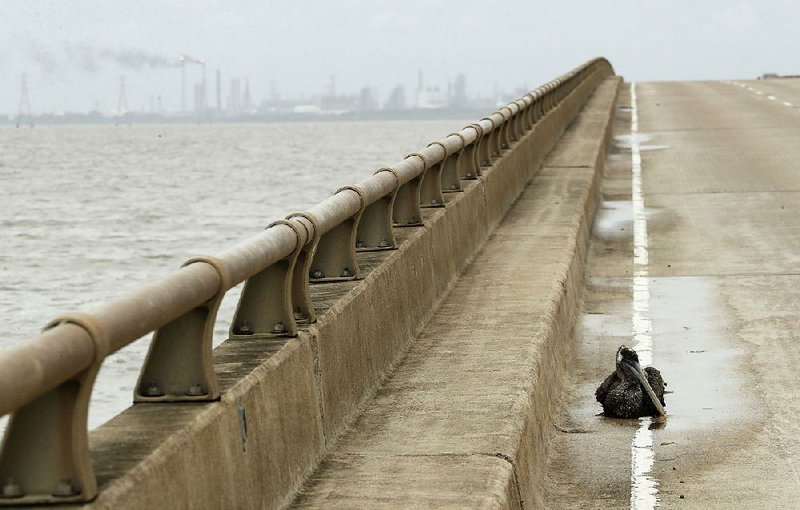The full extent of damage to the nation's oil and gas industry from Tropical Storm Harvey will not be clear for days, companies and experts said Monday, but the shutdowns equal about 15 percent of the nation's refining capacity.
The U.S. could see a 30 percent drop in refining capacity if the storm moves up the Texas coast toward Louisiana where additional shutdowns could occur.
Harvey, the strongest storm to hit the U.S. since 2004, has forced a drop of about 2.26 million barrels a day of crude refining capacity in Texas. Several pipelines have also been closed, potentially stranding crude in Texas and interrupting gasoline supplies to other parts of the country.
Less refining capacity will likely mean higher gasoline prices and lower oil prices, analysts said.
"There's a big drop-off suddenly in crude oil demand," John Kilduff, a partner at Again Capital LLC, a New York-based hedge fund, said by telephone. "We have a supply disruption event in gasoline production."
The national average price for gasoline at the pump moved only slightly on Monday, according to auto club AAA, but prices in some metro areas rose quickly over the weekend.
Harvey's widespread flooding led to the closing of Royal Dutch Shell PLC's Deer Park refinery and Exxon Mobil Corp.'s Baytown, Texas complex. Meanwhile, Magellan Midstream Partners LP suspended its inbound and outbound refined products and crude pipeline transportation services in the Houston area. Several energy traders shut their offices Monday, and Houston's utility said restoring power would take at least until Sept. 2.
Ports along a 250-mile stretch of Texas coast were shut to tankers. Fourteen vessels laden with a combined 7 million barrels of crude from as far afield as Brazil and Colombia were waiting off the coastline Monday.
[STORM TRACKER: Follow Harvey’s projected path]
Craig Pirrong, professor of finance and director of the Global Energy Management Institute at Bauer College of Business at the University of Houston, said in an email that it was "too early to tell [regarding] oil and gas. Gulf operations shut down, and they won't be able to assess until they go back. Refineries should be OK as long as they have power."
He said that "with most people and companies hunkered down, it's hard to get a comprehensive picture."
Petrochemical refineries were also closing, which will likely dent the economy over the next week. Chevron planned to shut down its Cedar Bayou facility through Sept. 6 because of the storm, according to PetroChem Wire.
"You're knocking out a significant portion of production with one event," said Kathy Hall, executive editor of PetroChem Wire. "A lot of these plants are very complex."
The Houston metropolitan area, the nation's fifth largest, accounted for 2.9 percent of the nation's gross domestic product as of 2015, and that figure is probably higher today, economists said. A good amount of that comes from trade: Texas accounts for about half of petroleum and gas exports, along with about a fifth of chemical exports.
The closed refineries "will no doubt [affect] gasoline and chemicals prices," said Brett Ryan, senior U.S. economist at Deutsche Bank.
The national average price of a gallon of gasoline on Monday was $2.37, up from $2.33, a week ago and $2.21 a year ago, according to auto club AAA. In Arkansas, the average price Monday was $2.12, up from $2.10 a week ago and $2.05 a year ago.
Gasoline for September delivery climbed 4.57 cents to settle at $1.7123 a gallon on the New York Mercantile Exchange after touching $1.7799 a gallon, the highest intraday price for a front-month contract since July 2015.
West Texas Intermediate crude for October delivery slipped $1.30 to settle at $46.57 a barrel, the lowest level in five weeks. Brent crude for October settlement dropped 52 cents to end the session at $51.89 a barrel on the London-based Intercontinental Exchange Futures Europe.
The storm drifted back into the Gulf of Mexico on Monday and was poised to regain strength before crashing into the Texas-Louisiana border, according to the National Hurricane Center.
Additional refinery shutdowns could occur in Port Arthur and Beaumont in Texas as well as in Lake Charles, La., Tudor Pickering Holt & Co. LLC analysts said. The nation's largest refinery in Port Arthur is operated by Motiva Enterprises LLC.
"Clearly, the storm is having much more of an impact on the refined product side than it is on the production side for oil and gas," Tamar Essner, an energy analyst at Nasdaq Inc. in New York, said by telephone. There is uncertainty about what type of potential flood damage could have occurred at these refineries or how long they will be offline, she said.
RELATED ARTICLES
http://www.arkansas…">13 million people in water-risk zonehttp://www.arkansas…">Trump vows swift aid to Texas
http://www.arkansas…">Much of state keeping watch as rain looms
http://www.arkansas…">State answers call for help in Texas
http://www.arkansas…">Shippers reroute, adjust for Harvey
http://www.arkansas…">Airlines cancel Houston flights
Information for this article was contributed by Jessica Summers, Perry Williams, Ben Sharples, Anthony DiPaola, Rebecca Spalding, Joe Carroll and Kristine Owram of Bloomberg News; Connor Dougherty of The New York Times; and Steve Mufson of The Washington Post.
Business on 08/29/2017
